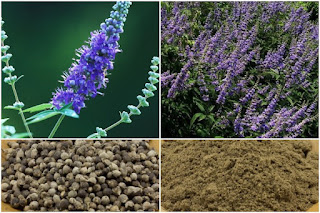Clove (Syzygium aromaticum)
Clove, scientifically known as Syzygium aromaticum, is a popular spice that is derived from the flower buds of the clove tree. Cloves are used in both culinary and medicinal applications due to their aromatic and flavorful properties. Here's some information about the use, dose, side effects, and nutritional value of cloves:
Use:
1. Culinary Use: Cloves are widely used in cooking and baking, especially in Asian, African, and Middle Eastern cuisines. They add a warm, sweet, and slightly spicy flavor to dishes, and are commonly used in spice blends, sauces, marinades, and desserts.
2. Medicinal Use: Cloves have been traditionally used in various cultures for their medicinal properties. They contain several bioactive compounds, such as eugenol, which exhibit antioxidant, antimicrobial, anti-inflammatory, and analgesic effects. Cloves are used in natural remedies for dental pain, digestive issues, respiratory problems, and as a natural expectorant.
Medicinally, cloves can aid in the relief of a wide variety of ailments, both internal and external. These include quieting an upset stomach and general digestion enhancement, reducing the severity of coughs, clearing sinuses, and providing effective relief from tooth pain due to analgesic properties. It has also been touted as an antimicrobial agent, with the ability to relieve excessive gas bloating. When the oil is applied topically, it can help relieve pain from rheumatism, arthritis, or other inflammation-based pain.
- Clove is commonly used for toothache, pain during dental work, dental plaque, hangover, indigestion, and many other conditions1.
- Clove oil contains a chemical called eugenol that might help decrease pain and fight infections
- Clove is also a popular ingredient in cigarettes.
Dose:
The recommended dosage of cloves can vary depending on the intended use and the individual's health condition. Here are a few common forms and doses:
1. Whole Cloves: When using whole cloves in cooking or preparing herbal remedies, typically a few whole cloves (1-3) are added to a dish or steeped in hot water for making tea.
2. Clove Oil: Clove oil is a concentrated form of cloves that should be used with caution. It is usually diluted before use. As a guideline, 1-2 drops of diluted clove oil can be used for dental pain relief, but it's important to follow the instructions on the product label or consult a healthcare professional for specific guidance.
3. Clove Supplements: If you're considering taking clove supplements, it's best to follow the instructions provided on the product packaging or consult a healthcare professional for appropriate dosage guidance.
The dosage of clove powder can vary depending on the intended use and individual factors. Here are some general guidelines for the use of clove powder:
1. Culinary Use: In cooking, the amount of clove powder used can vary depending on the recipe and personal preference. Typically, a pinch or 1/4 to 1/2 teaspoon of clove powder is used in dishes such as curries, stews, baked goods, or spice blends. It's important to start with a smaller amount and adjust according to taste.
2. Herbal Remedies: When using clove powder for its potential medicinal benefits, such as for dental pain relief or digestive issues, it's recommended to use a conservative dose. A common guideline is to mix 1/4 to 1/2 teaspoon of clove powder with warm water to make a mouth rinse or tea. However, it's important to note that using clove powder as a remedy should not substitute proper medical advice, and it's best to consult with a healthcare professional.
3. Supplements: Clove powder is also available in the form of capsules or tablets as a dietary supplement. The dosage instructions for clove powder supplements can vary depending on the specific product and concentration. It's important to follow the instructions provided by the manufacturer or consult with a healthcare professional for appropriate dosage guidance.
When using any form of clove powder, it's essential to remember that moderation is key. Excessive consumption of clove powder can lead to potential side effects. If you have any specific health concerns or questions regarding the use of clove powder, it's recommended to consult with a healthcare professional for personalized advice.
Side Effects:
While cloves are generally safe for most people when used in culinary amounts, some individuals may experience side effects or allergic reactions. Here are a few potential side effects:
1. Allergic Reactions: Some individuals may be allergic to cloves, resulting in symptoms such as itching, rash, or swelling. If you experience any allergic reactions, discontinue use and seek medical attention.
2. Gastrointestinal Disturbances: Consuming excessive amounts of cloves may cause gastrointestinal discomfort, including heartburn, diarrhea, or stomach upset.
3. Interaction with Medications: Cloves may interact with certain medications, such as blood-thinning drugs or anti-diabetic medications. If you are taking any medications, it's advisable to consult your healthcare provider before using cloves therapeutically.
Nutritional Value:
Cloves are rich in various nutrients and antioxidants. Although they are typically used in small amounts, here are some key nutritional components found in 1 teaspoon (2 grams) of ground cloves:
- Calories: 6
- Carbohydrates: 1 gram
- Fiber: 1 gram
- Vitamin C: 1% of the Daily Value (DV)
- Manganese: 4% of the DV
- Vitamin K: 1% of the DV
It's worth noting that the nutritional content may vary slightly depending on the brand and quality of the cloves.
Remember, while cloves have potential health benefits, it's important to use them in moderation as part of a balanced diet. If you have any specific health concerns or questions, it's recommended to consult with a healthcare professional or a registered dietitian.




Comments
Post a Comment